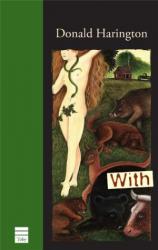With
Review
With
Donald Harington's prepositionally titled new novel, WITH, revisits
the dying town of Stay More, Arkansas, the Ozark encampment that
served as the setting for three of his previous novels (which have
been handsomely re-issued by Toby Press). The town and its environs
resemble Faulkner's Yoknapatawpha County, but as the story begins,
Stay More is dying the same death as so many rural communities
throughout the United States. Ignoring the plea of the town's name,
its residents are moving to bigger cities or heading out west to
California.
This is exactly what Sugrue "Sog" Alan, a Stay More native and
former police officer, claims to be doing when he sells all his
possessions and stocks up on supplies; he even goes so far as to
place a sign reading, "Gone to California," in the window of his
ramshackle home. Sog's intention, however, is not westward
migration, but a sojourn in the Ozarks --- with a kidnapped
eight-year-old girl named Robin Kerr.
Abducting her from a skating rink, Sog secrets Robin away to the
old, abandoned Madewell homestead, "resting on top of one of the
highest mountains in Newton County and practically impossible to
get to nowadays." Miles and miles of tough, treacherous terrain
separate them from the nearest human, and no vehicle can go beyond
the last "terrible mile of ravines and the rocky ledge along the
bluff and a godforsaken forest trail."
Here, Sog teaches her how to live off the land, but after he leaves
her --- and I'll let Harington tell you how he does --- Robin is
left alone in a house with no electricity, no running water, no
communication. But while her feelings toward Sog are understandably
complicated --- "After all, he was all she had in this world" ---
she manages to survive without television and radio, to get water
from the well, and to shoot wild boar and garden vegetables.
Robin makes friends with the animals who wander through the yard,
especially Sog's dog. He always calls her Bitch, but her name is
actually Hreapha, which is the sound of her bark. (In Harington's
mythology, dogs only speak their names, the reverse of human
speech, as humans so very rarely say their own names.) As the weird
and wonderfully inventive story develops, Robin's circle of faunal
friends grows to include a bobcat named (of course) Robert, a stag
named Dewey, a king snake named Queen of Sheba, a raccoon named
Ralgrub (burglar spelled backwards), and a bear named Paddington,
among many others. Not only are these animals articulate
characters, but Harington devotes chapters to many of them, letting
them tell the story from their own perspectives and in their own
voices.
She also befriends the spirit of a boy named Adam Madewell, who
grew up on the mountain that bears his family name and lived in the
house Robin and her pets now occupy. However, since the corporeal
version of him still lives and breathes in Napa Valley, California,
this version of Adam is no mere ghost, but rather is what he and
the animals know as an in-habit--- "an invisible,
unsmellable presence, a second self beyond the sense." Or, as
Hreapha explains, "An in-habit is part of someone who loves
a particular place so much that regardless of where they go they
always leave their in-habit behind." It's a complex notion,
one whose mysteries saturate nearly every page of WITH, and
Harington wisely leaves it nebulous and puzzling, the better to
pique the reader's imagination.
As this long novel progresses, it becomes increasingly epic and
intricate in story and scope, with Robin discovering her own
ingenuity and sexuality as she matures into a self-possessed woman.
Parallel to this maturation, Harington makes the novel more and
more formally playful by revealing deeper and deeper layers to the
story and its narrator. "Art is a form of a hiding and a seeking
and a finding," observes Robert the bobcat, "and that which is
hidden is more magically stimulating." Harington adheres
steadfastly to this aesthetic by burying ideas deep in the tale and
only revealing them slowly and gradually, a story as striptease. As
a result, the final hundred pages are as finely imagined and
gorgeously whimsical as anything you're likely to read this
year.
Or, as one of the canine characters declares, "In all my born days
I never heard tell of such marvels."
Reviewed by Stephen M. Deusner on January 24, 2011
With
- Publication Date: November 30, -0001
- Genres: Fiction
- Hardcover: 491 pages
- Publisher: Toby Press
- ISBN-10: 1592640508
- ISBN-13: 9781592640508




